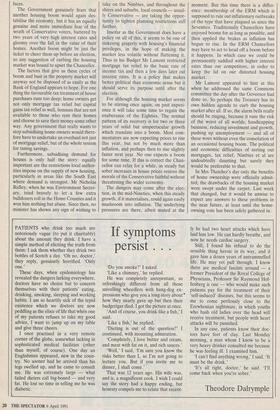If symptoms
persist . . .
PATIENTS who drink too much are notoriously vague (to put it charitably) about the amount they drink. I have a, simple method of eliciting the truth from them: I ask them whether they drink two bottles of Scotch a day. 'Oh no, doctor,' they reply, genuinely horrified. 'Only one.'
These days, when epidemiology has revealed the dangers lurking everywhere, doctors have no choice but to concern themselves with their patients' eating, drinking, smoking, sleeping and working habits. I am so heartily sick of the tepid existence which we doctors are now peddling as the elixir of life that when one of my patients refuses to take my good advice, I want to jump up on my table and give three cheers.
I once practised in a very remote corner of the globe, somewhat lacking in sophisticated medical facilities (other than myself, of course). One day an Englishman appeared, new in the coun- try. No sooner had he arrived than his legs swelled up, and he came to consult me. He was extremely large — what failed dieters call big-boned — and very fat. He lost no time in telling me he was diabetic. `Do you smoke?' I asked.
`Like a chimney,' he replied.
He was completely unrepentant, so refreshingly different from all those snivelling wheedlers with hang-dog ex- pressions who give you a long story about' how they nearly gave up but then their budgerigar died. I got the picture at once.
`And of course, you drink like a fish,' I said.
`Like a fish,' he replied.
`Dieting is out of the question?' I continued, with mounting admiration.
`Completely, I love butter and cream, and meat with fat on it, and rich sauces.'
`Well,' I said, I'm sure you know the risks better than I, so I'm not going to lecture you. But if you invite me to dinner, I shall come.'
That was 12 years ago. His wife was, and is, a magnificent cook. I wish I could say the story had a happy ending, but honesty compels me to relate that recent- ly he had two heart attacks which have laid him low. He can hardly breathe, and now he needs cardiac surgery.
Still, I found his refusal to do the sensible thing heroic in its way, and it gave him a dozen years of untrammelled life. He may yet pull through. I know there are medical fascists around — a former President of the Royal College of Physicians, Professor Sir Raymond Hof- fenberg is one — who would make such patients pay for the treatment of their `self-induced' diseases, but this seems to me to come perilously close to the Erewhonian nightmare, in which youths who bash old ladies over the head will receive treatment, but people with heart attacks will be punished.
In any case, patients know their doc- tors have feet of clay. Last Monday morning, a man whom I know to be a very heavy drinker consulted me because he was feeling ill. I examined him.
`I can't find anything wrong,' I said. 'It must be the drink.'
`It's all right, doctor,' he said. 'I'll come back when you're sober.'
Theodore Dalrymple


















































 Previous page
Previous page